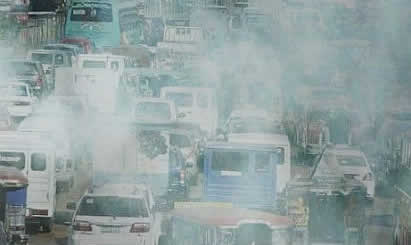|

 few days ago, the
Philippine Department of Energy (DOE) said that it would soon conduct a
study that would look into the imposition of additional excise taxes on
fuel and how that would impact the country's consumers. few days ago, the
Philippine Department of Energy (DOE) said that it would soon conduct a
study that would look into the imposition of additional excise taxes on
fuel and how that would impact the country's consumers.
At present, the
government levies a tax of PHP4.35 per liter on unleaded gasoline and
PHP5.35 per liter on leaded gasoline. And although the country uses
almost twice as much diesel fuel compared to gasoline (9.34 billion
liters for diesel versus 5.22 billion liters for gasoline in 2015), no
tax is currently levied on diesel fuel.
Given that the
majority of diesel engines found in Philippine vehicles are of the
older, more polluting type, it is no wonder that major cites like those
in Metro Manila appear as though they are layered with a coating of
grime all year round.
Aside from the carbon
dioxide (CO2) emitted by gasoline engines, diesel engine tailpipe
emissions also contain nitrous oxides (NOx) and particulates made up of
sulfur compounds. It is these emissions that make up the dirty brown
haze that envelopes many Philippine cities. It is these particulates
that affect the very young, the very old, and the more fragile Filipinos
who live in highly congested, highly polluted cities all over the
Philippines.
There are significant
costs directly connected to diesel emissions. The health of millions of
Filipinos have been directly compromised by emissions from diesel cars,
trucks, and buses—significantly greater than any damage caused by
gasoline engines.
The popularity of
diesel is in a way understandable. In the Philippines, diesel fuel is
cheaper—thanks in part to taxes being levied on gasoline but not on
diesel. Secondly, fuel economy on a diesel-powered vehicle is generally
better than gasoline-powered vehicles.
The majority of Buses
and jeepneys in the Philippines run on diesel and the government has
never been able to stand up to their unions who will surely oppose any
tax on diesel fuel—not to mention the tens of millions of commuters who
eventually will be the ones to bear the brunt of higher diesel prices
through increased fares. But at the end of the day, the ongoing damage
caused by diesel engine pollution has to be taken in to account and
those who use diesel engines have to start paying their fair share of
the ills these engines cause.
 We Filipinos are
top-notch when it comes to dramatics and pointing the finger at
developed countries who are big polluters. But truth be told, we do very
little to clean up our own back yard. We have done next to nothing to
reduce pollution in our air, in our land, in our rivers, and in our
seas. And so far, by not taxing diesel fuel we are refusing to recognize
the true cost of all the damage it causes. We Filipinos are
top-notch when it comes to dramatics and pointing the finger at
developed countries who are big polluters. But truth be told, we do very
little to clean up our own back yard. We have done next to nothing to
reduce pollution in our air, in our land, in our rivers, and in our
seas. And so far, by not taxing diesel fuel we are refusing to recognize
the true cost of all the damage it causes.
The question is, will
the DOE finally now have the courage to levy a tax on diesel fuel? A tax
that should be graduated over a period of years so that eventually
diesel fuel will be much more costly than gasoline?
Even today major cities
of the Philippines are already highly polluted. Medical ailments
directly related to this pollution are on the rise and will only
continue to worsen in the coming decades. We Filipinos must ask
ourselves: what kind of Philippines will our grandchildren and
great-grandchildren live in? The answer to that question will depend on
whether we, the Filipinos of today—unlike our parents and
grandparents—are willing to do what must be done to make the Philippines
of tomorrow a cleaner, more livable country.
Published
7/31/2016 |